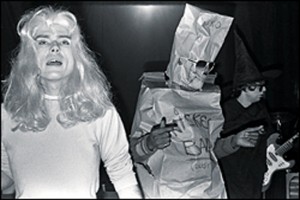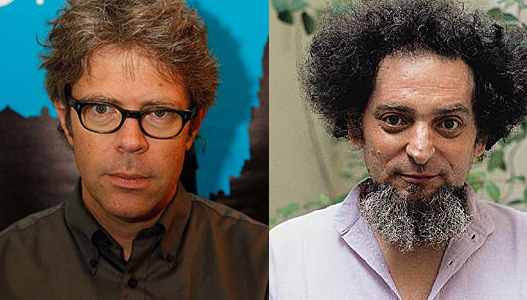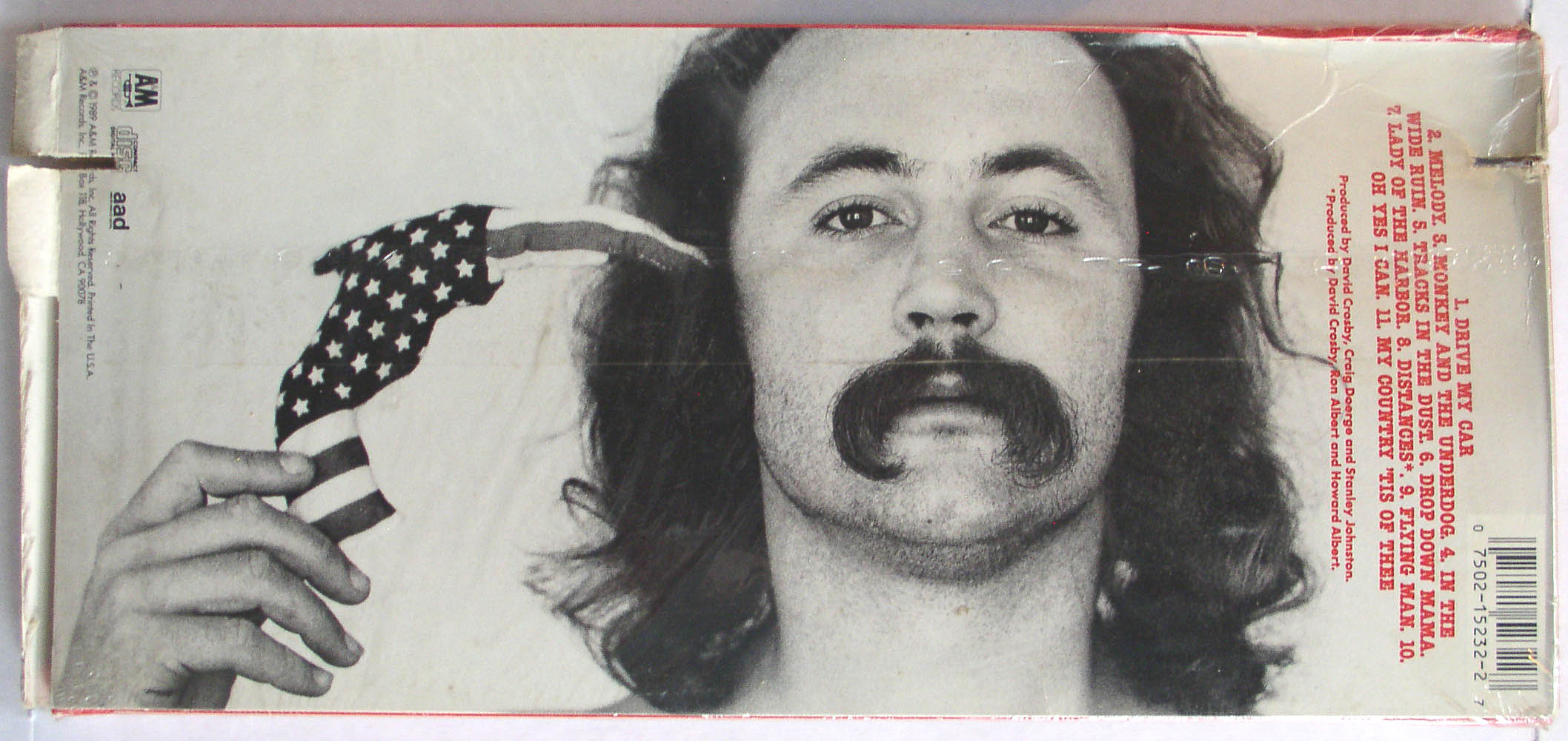No Thanks: A Simple Wish for the Ends of Alt Lit
Last week I watched Nathan Staplegun eat salted peanuts on spreecast. What started off as Nathan eating salted peanuts soon turned into Nathan asking his roommates or friends (and thus turning the computer camera in their direction) what they were preparing in the kitchen, and quickly became a spreecast showing one of Nathan’s online friends playing guitar. On the surface, Nathan Staplegun eating salted peanuts on television (that’s what platforms such as spreecast are: do-it-yourself TV) would seem like a snooze, a no-brainer, an excuse to read more books. But, what Nathan did was really great. He put on TV a thing that he would have done anyway and by doing it on TV turned the act of eating salted peanuts into something else: an event, perhaps.
I love to tell the story of Glenn O’Brien’s TV Party. In 1978, Glenn O’Brien and friends (and his friends were people like Jean-Michel Basquiat, Amos Poe, Deborah Harry, Walter Steding, Chris Stein) got together and decided to take advantage of public access cable television in New York City. The format was simple: hang out with friends, get high (one episode had Fab Five Freddy in costume teaching viewers how to roll perfect joints), have your friends play music, and talk to people (viewers called in live while the show was on air and used their short time to make death threats and complain about how shitty the show was). By television’s standards, the TV Party shows were shitty, but they were fun to watch. And, in their own way, became increasingly popular (special guests included David Byrne, Klaus Nomi, and Mick Jones of The Clash) and influential (in one of his early top ten lists David Letterman cited TV Party as an influence). Art and everyday life will never be separate things; although, the art marketers sure seem to want us to believe that they are. Friends get together, record each other doing silly things, or someone we hardly know broadcasts himself washing dishes or whatever, and art’s possibility is renewed, if not, realized.
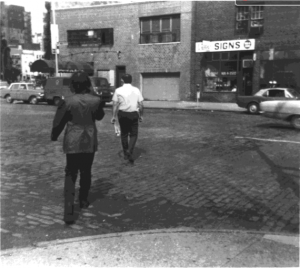
The word ‘creepy’ has not always had negative connotations. Vito Acconci follows people around New York City as part of his month-long performance ‘Following Piece’.
I have been kicking around the idea of starting a series of posts in which I cruise my facebook friends’ facebook photos and post the ones I like as part of ‘Creeper: Favorite Facebook Photos of My Facebook Friends’. The word ‘creep’ (and its variations) has not always had negative connotations. When Radiohead hit the pop charts in 1992 with their debut single “Creep” the song seemed like a strange, wonderful call to embrace the pathos of a loser, a lost subcultural weirdo whose dreams and desires are too much for himself and the world. Much like Beck’s “Loser” the song seemed to reinvigorate a long-standing yet dangerous tradition in the arts: the elevation of the low, the loser, the outsider, the emotional clown, to the status of cultural barometer, of artist. Long-standing because American cultural producers had carefully exploited this type for profit since the early days of white rock ‘n’ roll (Elvis Presley) and the first teen films (Rebel Without A Cause). Dangerous because sometimes people actually believed in these characterizations enough to begin to act like rebels, not satisfied with merely listening to them on the radio or watching them at the movies.
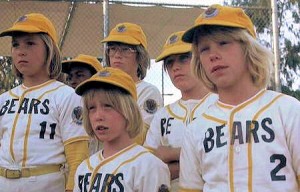
It’s not Dennis Cooper’s male escorts of the month. It’s The Bad News Bears (1976), who demonstrated that life sometimes artfully happens when a bunch of losers get together and push the game to its limits.
In 1969, Vito Acconci made art by simply following people around New York City. Acconci spotted someone on the street and followed them until they disappeared into a place he couldn’t, or didn’t, want to go. Acconci’s performance lasted almost a month. He’d get up, go outside, spot someone, and follow. Most spreecasts, for better or for worse, go on way too long. But, so does hanging out with one’s friends. At some point, you want to be by yourself or hang out with someone else. With the advent of the spreecast you can hang out with people you know or don’t know or want to know simply by joining in. It’s the logic of the club but not as restrictive. Of course, hanging out on spreecasts may never beat the intimacy of being in the same room with a friend or a loved one or turning it all off and reading a book. But I’ve known a lot of people who got all the companionship they needed by simply watching episodes of Breaking Bad or whatever–and apparently, according to some, you can be plugged in and still experience solitude.
This isn’t a plug for spreecast, who I could give two fucks about. It is a plug for a kind of art that denies the art market and realizes itself in everyday life. One doesn’t need an important architectural group, a big publisher, and a major museum to support an effort to follow and document people in your neighbor (although Acconci had all of those). One does need ideas. I was talking to Elizabeth Emily D’Agostino in her car about art. We were parked outside my apartment–a perfect venue to discuss anything. Our conversation shifted to cultural amnesia, an easy target. In our desperate efforts to predict the future I described for her a story written by Tao Lin and boldly proclaimed that this was Lin’s crowning moment and that history would look at this moment as an opportunity lost. The story is simple enough:
when i was five
i went fishing with my family
my dad caught a turtle
my mom caught a snapper
my brother caught a crab
i caught a whale
that night we ate crab
the next night we ate turtle
the next night we ate snapper
the next night we ate whale [. . .]
The last line of the story is repeated almost endlessly or as long as the writer/reader can endure it. Although, I have read a version of it where it ends rather abruptly. For a video account of its hilarity, you can listen to Tao read it here.
Why an opportunity lost? Because when an artist with the talent of Tao Lin comes along he seems to come with a two-pronged fork capable of reflecting the zeigeist back to us and/or breaking the hold the zeigeist has on our attitudes, desires, fashions, discourses, etc. In the post-Warholian world in which we live contemporary artists have made it clear that they are more interested in and perhaps more capable of showing us who they are (i.e. reflecting the ‘zeigeist’ back to us) than breaking the mirrors that bind us to a social-medial and political-economic worldview that reinforces the notion that ‘we’re fucked.’
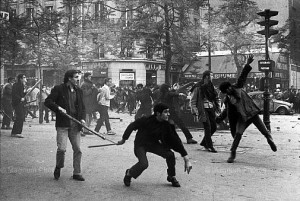
May 1968, France. Today, the attitudes and aspirations of the ‘me generation’ of the 1970s have resurfaced in the attitudes and aspirations of millennial artists.
We are fucked. In Sheila Heti’s novel, How Should a Person Be?, someone comes up with an idea for an ugly painting competition. I say ‘someone’ because not even Sheila, our narrator, knows who came up with the idea. The idea of making the ugliest painting is more difficult than you’d think. Relationships are ended, lives are changed. During the height of the national crisis that was punk rock in England in the 1970s, a roadie for The Who dismissed the movement as a mere ‘revolt of the uglies.’ I mean, imagine calling a bunch of teenagers parading their misfortunes, economic hardships, childhood traumas, bad skin, social awkwardnesses, and fashion made of actual garbage found in the street as revolting or, worse, ugly? It is with these two sentiments in mind–a conceptual call to ugliness in the name of something else (Heti) and its celebration as an insult (punks)–that I invoke the writers and artists of the alt lit movement, a movement that has come to signify everything that’s right and wrong about everything that’s fast, cheap, and out-of-control in the arts today. Perhaps the time has come to break the mirrors that bind us to our own little personal victories (i.e. ‘I’m internet famous’) and begin the more fun and difficult work of smashing those fucking mirrors so that we–and the big, bad world–may see ourselves again, as something else, something more, something seemingly uglier and thus, perhaps, more beautiful. Of course, you could choose to ignore me (I’m used to it, really)–your career path probably profiting more from it–than listen to me whisper to you, from the salted peanut gallery.
@janeysmithkills
kottonkandyklouds.tumblr.com
Social Media is Unchristian
Once I read a really revealing book about social media and the primary 21st century economy. The book I speak of is 24/7 by Columbia University boy Jonathan Crary.
Jonathan’s thesis is that American and Americanlike people reside in a contemptuous 24/7 universe. Throughout the book, Jonathan explains what the term “24/7” means to him. According to Jonathan, 24/7 is a “time of indifference” that “renders plausible, even normal, the idea of working without pause, without limits.” If 24/7 was a person, it’d be an indelicate, indiscriminate one who insists on pumping out putrid products (like iPads and bisexuals) even on the most divine day of the year: Christmastime. 24/7 “decrees the absoluteness of availability.” Like those excessively-sexed gays, 24/7 people are always available. Whether it’s formulating a Facebook status, an Instagram, or a Tweet, in the 24/7 zone, accumulation occurs nonstop.
The base of 24/7 people’s identity is social media. Jonathan says that there are “numerous pressures” for these types to be like the “dematerialized commodities and social connections in which they are immersed so extensively.” Jonathan then posits that 24/ people “invent a self-understanding that optimizes or facilitates their participation in digital milieus and speeds.” Oscar says, “One should either be a work of art, or wear a work of art.” 24/7 people, though, want to be their social media accounts: open, overt, public, and explicit. Mystery and secrets are assaulted. Unlike the thrilling Victorian tales, where colonized girls are kept in attics and orphan boys haunt feverish heroines, 24/7 people conceal nothing, since their circumstances command constant communication.
Google boy Eric Schmidt deems the 21st century the “attention economy.” For Jonathan, Eric and others (like that utterly un-stylish Mark Zuckerberg), aim to normalize “unbroken engagement with illuminated screens of diverse kinds that unremittingly demand interest or response.” In the 24/7 world, thought and reflection are allocated little value. Any moment that isn’t spent liking something or refreshing something or commenting on something is of no use, since it’s a moment devoid of production.
One of the sharpest and staunchest Christian boys ever, John Milton, believed that the commendable Christian’s primary task is to search for truth. Eden is so estimable because truth is installed in one location: God. All one must do is obey Him. But Eve (a girl) didn’t do that, so she, her boy, and consolidated truth bid bye-bye. Now, in the perverted postlapsarian predicament, Milton says truth “opens herself faster than the pace of method and discourse can overtake her.” Post-Eden truth is mobile, quick, nimble, and elusive. But the wonderful Christian never ceases to try to collect as much of it as he can. Through reading, reflecting, and thought, Milton could capture truth and “unite those dissevered pieces.”
The 24/7 world and Christianity are archenemies. The former is founded on careless compulsion, while the latter is infinitely entwined with divine consideration.
God engenders everything, so he obviously made Instagram, Twitter, and so on. But God is also really mischievous (just ask Job), so maybe he made these things to separate the thoughtful ones (Christians) from the fartheads (unchristians). Eric Schmidt and Mark Zuckerberg and all those other Cali boys may have mounds of power now, but when the coda comes, they’ll be spending their forever in hell, not heaven.
ToBS R4: ‘everybody has a story’ vs. Daily facebook updates of what you ate

[matchup #58 in Tournament of Bookshit]
Well, I really wanted this one to go the other way. I know I’m meant to be impartial, but really: everybody has a story? Um, no they don’t. (See, you can’t even talk about it without getting into the whole pronoun thing.) Everybody has a skull, sure, and a pet fish, but a story? Most people have neither beginning, middle, nor end. They just sort of float out there waiting to get stabbed.
Whereas, daily Facebook updates of what you ate? Yum! More please. You had kale? You pig, you did not! Bonus points if you braised something, because I don’t know what that means. But it sounds delish. READ MORE >
What the Facebook IPO Means For Young Writers

Nothing Left To Buy:
A detailed analysis of the Facebook IPO:
i’m the only finance writer without any understanding of desire. i’m soft like the sound of a dead freeway or the jam band that plays in a warehouse above the impossibly cute shopping district. all the helpful selling colors. this is china in the future. the TVs are 40% thinner in 2050. american is 40% thinner. there are fewer white babies. people want things like food that is free from toxins and movies with uncompromising ethnic super heros. little kids want to grow up to be anything. anything at all would be better than youth. education today is like an expensive prison for brilliant young interns with no tasks to complete. there’s nothing but screens showing images of other screens. jean baudrillard’s nephew was right about that french restaurant – it’s really delicious if you can get a reservation by email. no i can’t give you the email sorry. i was asked not to.
ToBS R2: Facebook-based political ‘activism’ vs. litblogging at age 35
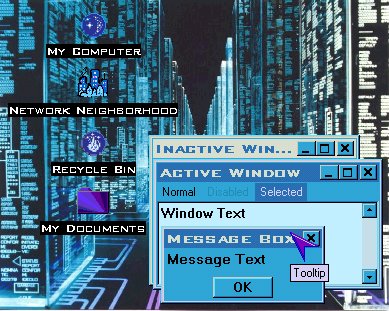
[The tournament is back on! It will be decided before the 1 year anniversary of the tournament!– ed.]
[matchup #48 in Tournament of Bookshit]
i’m not on facebook, cause i guess i’m like THAT GUY or whatever, so what happened is that my gf gave me her login info so that i could browse it and be able to accurately judge this battle but all i did was look at her emails and private messages, and, like, pictures of dudes who comment on her pictures and also i looked at pictures of attractive women who seemed to show up a lot in general. but right now i can’t think of a single thing worse than facebook-based political ‘activism’ such as the bunch of posts i couldn’t help seeing that attempted to ‘deal with the problem’ of animal suffering and eating meat re thanksgiving and veganism. i maybe half respected the lady on the street who yelled “make the leap, go vegan!” at me as i passed but what i did on thanksgiving was sneak downstairs late after dinner and eat cold turkey by the light of the refrigerator, thinking of her. do i even have to mention ows here or can i just ignore it the same way everyone ignored the local elections last month? READ MORE >
Pseudonyms, Authenticity, and Internet Identity
When I was a kid I made up a superhero named Dr. Power. He wore a blue costume, carried a purple Frisbee not unlike Captain America’s shield, and whatever powers he possessed were derivative of whatever comic books I’d been reading at the time.
Drawing Dr. Power wasn’t enough. I wanted to be him. My mom encouraged my eight-year-old fantasy by making me a handsome cape out of blue velvet, and I made my own mask out of paper-mache. The mask sucked, it was thick and heavy and weird-smelling, and I could barely see anything out of the eye holes, but I thought it looked pretty cool.
For some reason it was important that my friends believed Dr. Power was real, and not just my super alter ego. So I had my brother take a picture of me standing next to Dr. Power while Dr. Power did pull-ups in our bedroom doorway. See, that’s the best you could get with Dr. Power, because he didn’t have time for photo shoots. He had to stay fit. Eveready. You never know when your next deranged enemy will come busting through the wall.
ToBS R1: Calling yrself editor-in-chief of online jrnl vs posting pics of other people’s books on facebook
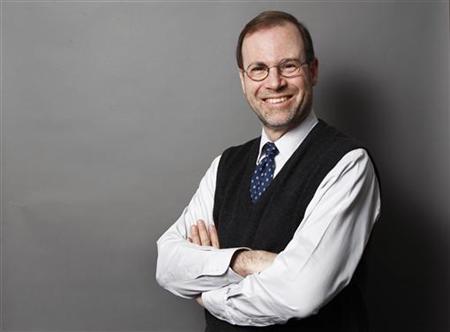
[Matchup #7 in Tournament of Bookshit]
Why do you call yourself the editor-in-chief (or even the chief editor) of an online lit journal? This isn’t The New York Times. It’s a fart with a header. It’s a blogspot. You are the editor-in-chief of a blogspot. I hope you cite your role as editor-in-chief of the blogspot when you submit to other blogspots. I hope mad honeys come to your release party for the blogspot. I hope you get a lot of ass.
Lucky for you there is a literary action that is a shade lamer and that is…
Posting photos of other people’s shitty first books on fb with the caption “Look what came in the mail! Going to be a great weekend!”
No. It is not going to be a great weekend. READ MORE >
We Are All Very Busy Being Busy
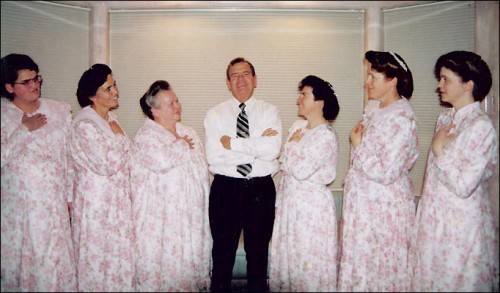
We are all very busy. We are busy being busy. We worship at the altar and suckle at the teat of busy. When I say we, I mean you, me, us. We are a cult of busy busy people. If you are busy, we will follow you and drink your Kool-Aid. We love to talk about how busy we are. We say I’m busy, I’m busy, I’m busy—an exultation. We say we are busy and feel flushed. We are busy, therefore we are. To be busy is to be important and to be important is everything. We will Twitter and Facebook and blog our busyness and we will do so with the conviction of martyrs. We will bear our busy burden. The burden of busy must be borne because to be busy is to be important and to be important is to matter. We matter and are made of matter which is meta. We have work and school and work and school. We study, we teach, we grade and grade and grade. We live below the poverty line but revel in that poverty because we have a second and third job that keep us busy. We go to mind numbing office jobs where we are busy with boredom. We hold cushy corporate positions we love to talk about because we make so much money being busy we don’t have the time to spend it. We have meetings and sometimes we have meetings within our meetings because we are that damn busy. In our limited free time we edit three magazines and run a small press and we may never respond to you or actually publish anything but we’re on the masthead and we have many official sounding titles so we have proof we are that busy. We get so many emails each day demanding our attention and our time and we try to keep up but we cannot so we are busy stemming the tide of electronic correspondence, sending messages but never reading the responses. We have online presences so we have to visit several sites every few seconds to remind ourselves and everyone we know and love and loathe how busy we are. We write 3,500 words a day and then exhaustively edit those 3,500 words once twice three times and we make sure to mention on Facebook that we’ve done those things, oh yes, we will tell you what we’ve written for the day and how important we are for taking that care with our words despite how busy we are. We will tell you what we are going to write while you idle people are sleeping because we do not sleep, we do not need sleep, we have not the time for sleep. We will go places and meet people while we are there though we won’t spend too long because we are so busy. We’re in four writing groups where we critique the work of our friends and enemies and later talk shit about that writing to other friends and enemies. We read obscure literary texts and think deep thoughts about those obscure literary texts and write things about those obscure literary texts so everyone knows we are reading obscure literary texts despite the fact we are so busy. We curate two reading series and boast about all the Internet Famous writers who will be reading with us. We pretend we don’t watch television but really we do, oh how we do and we spend moments of our precious time thinking about the unbelievable fact that Vanilla Ice has a reality show on DIY and how none of the new TV shows this fall are any good even though we can’t stop watching them. We have kids and those kids never leave us alone when we are busy working on our laptops but the kids are so damn cute so we’ll bitch about how busy they keep us and how much we love them even though they get in the way. We’re married or in relationships and once in a while we have to have sex with our significant others and otherwise give them some attention. We look at our lovers day in and day out and acknowledge that yes, this is really it for the rest of our lives and while we’re so busy, we ignore the nagging feeling we are doing everything yet nothing at all because we are far too busy to do anything well and doing all of that each and every day keeps us extraordinarily busy—it is a vicious cycle.

